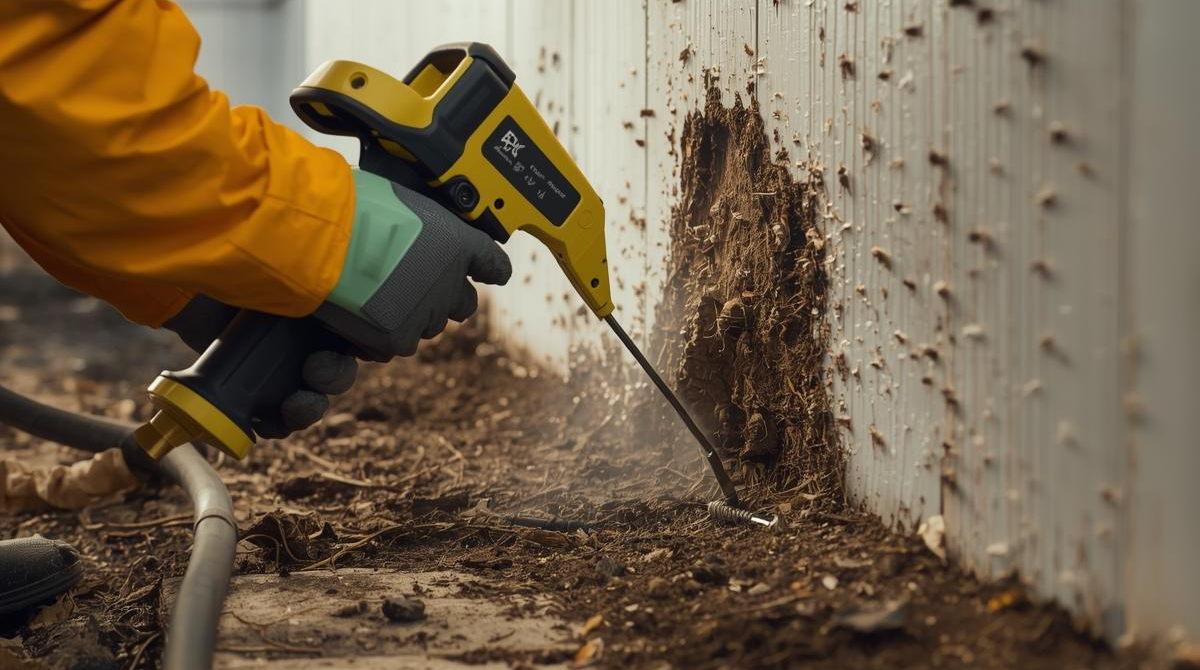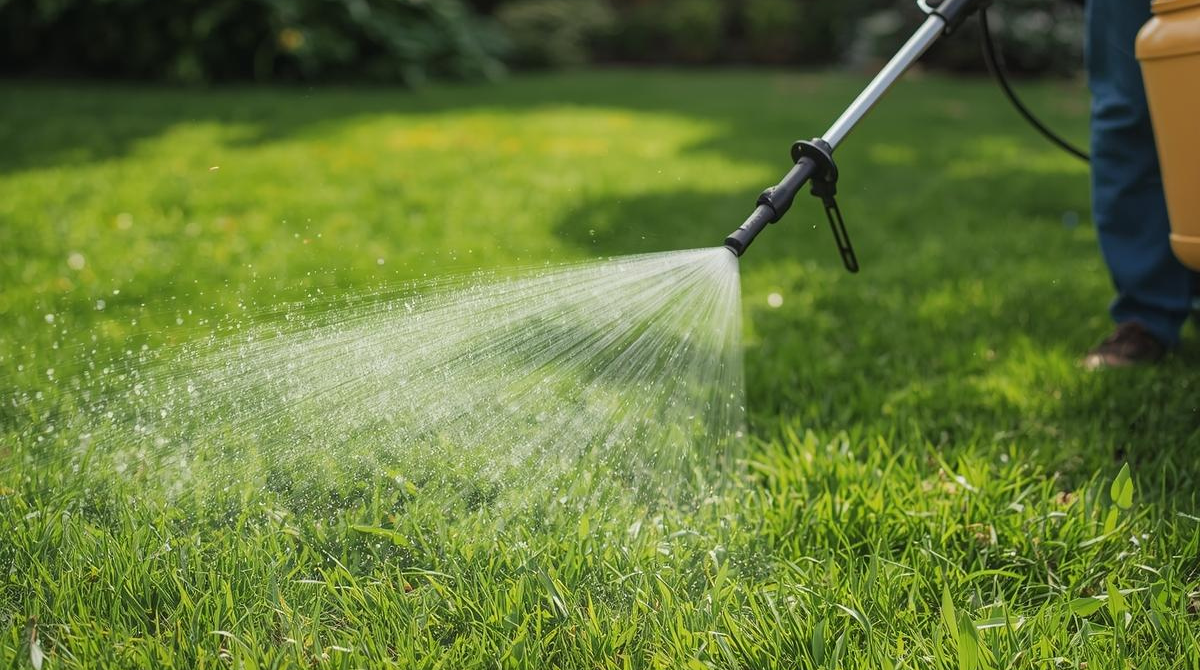How Often Should You Schedule a Pest Control Visit?
Dealing with pests can be a real headache. You know, the kind that makes you want to just call a pro and be done with it. But how often do you actually need them to come out? It's not always a simple answer, and a lot depends on your specific situation. We're talking about where you live, what kind of critters are bugging you, and even how tidy you keep things. Let's break down what you need to know to figure out the best pest control schedule for your home.
Key Takeaways
- Most homes benefit from regular pest control, often recommended quarterly, to stay ahead of potential problems.
- Your location, the specific pests you're dealing with, and the severity of any infestation all play a big role in how often you'll need service.
- While quarterly visits are common for general protection, severe infestations or living in high-pest areas might require more frequent treatments, like monthly pest control.
- Seasonal changes significantly impact pest activity, with spring and fall often being peak times when pests look for shelter or food.
- Proactive measures, like sealing entry points and maintaining cleanliness, work hand-in-hand with professional treatments to keep your home pest-free.
Understanding How Often Pest Control Is Needed
Figuring out how often you need pest control isn't a one-size-fits-all kind of deal. It really depends on a bunch of things specific to your situation. Think of it like this: your neighbor might be fine with just an annual check-up, but you might need something more frequent. It's all about what's going on with your home and where you live.
The Situational Nature of Pest Control
Honestly, there's no magic number for how often pest control visits should happen. It’s not like getting your oil changed every 3,000 miles. Every house and every pest problem is unique. What works for one person might not work at all for another. It’s really about assessing your specific needs and environment. Sometimes, a quick treatment is all that's needed, while other times, a more consistent approach is better. It’s about being smart and proactive rather than just waiting for a problem to get out of hand.
Factors Influencing Pest Control Frequency
Several things play a role in deciding how often you should have professionals come out. Your location is a big one; if you live somewhere with mild winters, pests might be active all year round, meaning you'll likely need more frequent visits. The types of pests you're dealing with also matter. Some pests, like ants or spiders, might be manageable with quarterly visits, but if you're battling something tougher like termites or bed bugs, you'll probably need more attention. The size of your property and how many potential entry points there are can also influence the schedule. Even your personal comfort level with pests makes a difference – some people can't stand seeing a single spider, while others are okay with a few.
The Importance of Proactive Pest Management
It’s generally better to prevent pest problems before they start or become major issues. Waiting until you see a swarm of ants or a mouse scurrying across the floor means the infestation is already underway. Proactive pest management means staying ahead of the curve. This could involve regular inspections and treatments, especially if you live in an area known for certain pests or if your home has a history of infestations. Think of it as routine maintenance for your home's defense against unwanted guests. This approach can save you a lot of hassle and potential damage down the line. For instance, getting annual inspections for termites is a smart move to protect your investment, as these pests can cause significant structural damage if left unchecked. annual inspections are a good starting point for many homeowners.
Being proactive means you're less likely to face a serious infestation that requires intensive and costly treatments later on. It's about maintaining a comfortable and healthy living environment consistently.
Common Pest Control Schedules
When it comes to keeping your home free from unwanted guests, there isn't a single magic number for how often you need professional pest control. It really depends on a few things, but most experts suggest a baseline to start with.
Quarterly Visits for General Protection
For many homeowners, a good starting point is scheduling pest control services every three months, or quarterly. This approach is great for general protection against common household pests like ants, spiders, roaches, and silverfish. Think of it as a regular tune-up for your home's defenses. These visits help maintain a barrier around your property, stopping pests before they even think about coming inside. Plus, the pest control company can spot early signs of trouble that you might miss.
Annual Inspections for Specific Pests
Some pests, like termites, don't necessarily require quarterly visits. Instead, an annual inspection might be sufficient. These specialized inspections focus on identifying and preventing damage from pests that can cause significant structural issues over time. If you live in an area known for termites or other wood-destroying insects, an annual check-up is a smart move.
When Monthly Pest Control Becomes Necessary
There are situations where you might need more frequent attention. If you're dealing with a persistent infestation, especially with pests that reproduce quickly or are harder to eliminate, monthly visits might be the answer. This is also common for people living in apartments or townhomes where pests can easily travel between units. High-pest-pressure areas or specific pest behaviors might also call for more frequent treatments to keep things under control.
Factors Dictating Pest Control Visits
Deciding how often you need pest control isn't a one-size-fits-all deal. A lot of things play a role in what makes sense for your home. Think of it like this: your neighbor in a different climate might need different service than you do, even if you both have the same type of house.
Your Geographic Location and Climate
Where you live really matters. If you're in a warmer, more humid area, pests tend to be active for more of the year. This means you might need more frequent check-ins from your pest control service to keep things under control. On the flip side, if you're in a place with distinct seasons, pest activity might ramp up during certain times, like spring and fall, and you might adjust your service schedule accordingly. Your local pest control company is usually the best source for knowing what pests are common in your specific region and when they're most active.
The Types of Pests Encountered
Some pests are more of a nuisance, while others can pose serious health risks or cause significant damage to your home. For instance, a few ants on the kitchen counter are one thing, but a cockroach problem or a termite issue is a whole different ballgame. Pests that can spread diseases or damage structures often require more immediate and consistent attention. Knowing what you're dealing with helps determine the urgency and frequency of treatments needed.
The Severity of Pest Infestations
This one's pretty straightforward. If you're currently dealing with a major pest problem, you'll likely need more frequent visits to get it under control. Once the infestation is managed, you might be able to switch to a less frequent, more preventative schedule. It’s about tackling the immediate issue first and then moving to maintenance. A professional can assess the situation and recommend a plan that starts with getting the population down and then keeping it that way.
It's generally better to be proactive with pest control rather than waiting until you have a full-blown infestation. Catching small issues early can save you a lot of trouble and expense down the road.
Seasonal Pest Activity and Treatment Timing
The time of year really matters when it comes to pests. Different bugs and critters have their own schedules for when they're most active, looking for food, or trying to find a place to hang out for a while. Understanding this seasonal activity can help you and your pest control provider time treatments just right.
Spring Pest Emergence
As things warm up after winter, many pests start to wake up and get moving. They're looking for food and places to start new colonies. This is often when we see things like rodents becoming more active again, and subterranean termites might start swarming. It’s a good time to get ahead of potential problems before populations really build up.
Summer Pest Pressures
Summer is usually a busy time for pests. The warmer weather means more bugs are out and about, and they're actively seeking food and water, which can easily lead them into our homes. Ants, fleas, and spiders are common culprits during these months. If you've had issues before, this is when they can really take hold if not managed.
Autumn Pest Seeking Shelter
When the temperatures start to drop in the fall, pests begin looking for a warm, safe place to spend the winter. Your house can look pretty inviting to them. This is a peak time for pests like spiders, ants, and rodents trying to get inside. It’s also a time when drywood termites might still be active, looking for wood to infest before the cold really sets in.
Year-Round Pest Concerns
While some pests are definitely seasonal, there are a few that don't really take a break. Bed bugs, cockroaches, and nuisance birds can pop up any time of year, regardless of the weather outside. These types of pests often require consistent attention and might need treatments that address them throughout the entire year, not just during their peak seasons. For general protection against a wide range of common pests, a quarterly pest control schedule is often recommended to disrupt their life cycles effectively.
Being aware of these seasonal shifts helps in planning pest control visits. It’s not just about reacting to a problem, but about being smart with your treatments to stay ahead of the pests.
Home Characteristics Affecting Pest Control Needs
The kind of home you live in really matters when it comes to keeping pests out. If you’re in an apartment, condo, or townhouse, you’re sharing walls with neighbors. This means you don’t have total control over what’s happening next door, and pests can easily travel between units. Because of this, it’s smart to be extra careful and maybe even schedule more frequent check-ups. Think about it: if your neighbor has a problem, it could become your problem pretty quickly.
Larger properties, or homes with lots of little nooks and crannies, can also present more challenges. More doors, windows, and potential entry points mean more opportunities for pests to sneak in. A big house might need more attention than a small, well-sealed one. It’s also worth considering your home’s history. If you’ve had issues with certain pests before, like ants marching into your kitchen every summer, it’s wise to get ahead of the problem. Don’t wait until you see a swarm; try to tackle it before the season even starts. This proactive approach can save you a lot of hassle later on.
- Shared Walls: Apartments and townhomes mean pests can move between units easily.
- Entry Points: More doors, windows, and cracks mean more ways for pests to get in.
- Home History: Past infestations often signal a need for ongoing vigilance.
Your home's structure and its neighbors play a big role in how often you'll need pest control. Being aware of these factors helps you make a better plan to keep your living space comfortable and pest-free.
If you're dealing with a recurring issue, like ants that always seem to find their way in, it's a good idea to talk to your pest control provider about a plan that addresses this history. They can help you figure out the best schedule to prevent those unwelcome guests from returning. You can find more information on pest control plans for your area by looking up pest control plans.
When to Consider More Frequent Treatments
Sometimes, the usual schedule just isn't enough. If you're dealing with a really bad pest problem, or if you live in an area where pests are just a constant battle, you might need to call in the pros more often than the standard quarterly visit. Think about it: if you're seeing pests pop up again just a month or two after a treatment, that's a pretty clear sign that your situation needs a bit more attention. It's not about being picky; it's about protecting your home and your health.
Addressing Severe Infestations
When pests have really taken over, a one-off treatment or even a quarterly schedule might not cut it. Severe infestations, like a major ant trail marching through your kitchen or a noticeable roach problem, often require more frequent interventions to get them under control. This could mean monthly visits initially, until the population is significantly reduced and the underlying causes are addressed. It's a bit like fighting a fire – you need to hit it hard and often at first.
Living in High-Pest-Pressure Areas
Some places just seem to attract more bugs and critters, no matter what you do. If you're in a region with a warm, humid climate year-round, or if your home is surrounded by natural areas that provide plenty of food and shelter for pests, you might find yourself needing more frequent treatments. Your pest control company can tell you if your area is known for high pest activity. In these cases, monthly or bi-monthly visits can make a big difference in keeping pests from becoming a persistent nuisance.
Specific Pest Behaviors Requiring Attention
Certain pests have life cycles or behaviors that demand more frequent attention. For example, some pests might reproduce very quickly, meaning a treatment's effectiveness wears off before the next generation can be dealt with. Others might be particularly destructive or pose significant health risks, making immediate and repeated action necessary. If you're dealing with something like bed bugs, which are notoriously difficult to eradicate and can reproduce rapidly, you'll likely need a more intensive treatment schedule until the problem is completely solved. It’s always best to discuss the specific pest you’re dealing with and its habits with your pest control provider to figure out the best plan.
The Benefits of Regular Professional Pest Control
When you think about pest control, it's easy to just focus on getting rid of the bugs you see right now. But regular professional visits do a lot more than just that. They're really about keeping your home safe and sound in the long run. Think of it like getting your car serviced – you don't wait for it to break down, right? Same idea here.
Preventing Future Infestations
One of the biggest pluses of sticking to a schedule is that it stops problems before they even start. Professionals know where pests like to hide and breed. They can put treatments in place that act as a barrier, stopping pests from getting inside in the first place. This proactive approach means you’re less likely to deal with a full-blown infestation later on. It’s much easier to keep pests out than to kick them out once they’ve moved in. For example, quarterly treatments can handle common invaders like ants, spiders, and roaches before they become a big issue.
Reducing Health Risks Associated with Pests
Let's be honest, pests aren't just annoying; they can be a health hazard. Rodents and some insects can carry diseases that can spread to your family and pets. Cockroaches, for instance, can trigger asthma and allergies. Regular pest control helps reduce these risks by keeping these disease carriers out of your living space. It’s a way to protect your household’s well-being without having to constantly worry about what might be lurking around.
Avoiding Costly Property Damage
Pests can cause a surprising amount of damage to your home. Termites can eat away at wooden structures, leading to expensive repairs. Rodents might chew through electrical wires, creating fire hazards. Even smaller pests can damage stored items or contaminate food. Professional pest control helps prevent this kind of damage. By taking care of pests early, you save yourself the headache and the hefty bills that come with repairing damage caused by an infestation. If you suspect termites, it's wise to get a professional inspection from a company like Paragon Pest Solutions.
Here’s a quick look at what regular visits can help prevent:
- Structural Damage: Pests like termites and carpenter ants can weaken wood over time.
- Contamination: Rodents and insects can contaminate food and surfaces with bacteria and waste.
- Electrical Hazards: Chewing by rodents can damage wiring, posing a fire risk.
- Allergens and Irritants: Droppings and body parts from certain pests can worsen allergies and asthma.
Regular professional pest control is an investment in your home's health and longevity. It's about peace of mind, knowing that you're actively protecting your family and property from potential threats.
Maximizing the Effectiveness of Pest Control Treatments
Making sure your pest control treatments actually work and keep working is a big deal. It’s not just about spraying some stuff and hoping for the best. You've got to think about how the pros do their job and what you can do at home to help.
The Role of Professional Expertise
Honestly, the folks who do this for a living know their stuff. They can spot the tiny signs of a problem you’d totally miss, like a small crack where ants are getting in or a damp spot that attracts termites. They also have access to treatments that aren't available to the public, and they know exactly how to use them safely and effectively. Getting a professional involved means you’re using the right tools and knowledge from the start. It’s like trying to fix a leaky faucet yourself versus calling a plumber – one is usually a lot less frustrating and more successful.
Understanding Treatment Durations
Different pests need different approaches, and treatments don't last forever. For general creepy-crawlies like spiders and ants, a treatment might keep things at bay for a few months. But if you're dealing with something tougher, like a termite issue or a persistent rodent problem, it might take longer and require follow-up visits. It’s good to know what to expect so you’re not surprised when you see a bug a few months down the line. For example, some treatments might be effective for about 90 days, making quarterly visits a common recommendation for general upkeep.
Here’s a rough idea:
- General Pests (Ants, Spiders, Roaches): Often effective for 3-4 months.
- Rodents: May require ongoing monitoring and treatments.
- Termites: Treatments can be long-term, but often need professional inspection and re-application.
- Bed Bugs: Can take multiple treatments over several weeks or months to fully eliminate.
Implementing Preventative Measures
This is where you really make a difference between visits. Think of it as helping the pest control company do their job better. Simple things can stop pests from even wanting to come inside.
- Keep food sealed up tight, both in your pantry and in trash cans.
- Fix any leaky pipes or damp areas, as moisture attracts all sorts of unwanted guests.
- Seal up any small holes or cracks in your walls or around windows and doors. Even a tiny gap is an invitation.
- Keep your yard tidy, especially around the foundation of your house. Trim back bushes and remove leaf litter.
Doing these little things consistently can really cut down on the number of pests that make it inside, meaning your professional treatments can focus on any stragglers or hidden nests. It’s a team effort, really.
If you're in the Melbourne, FL area and looking for reliable service, consider checking out Paragon Pest Solutions. They've been around for a while and know how to handle local pests.
Tailoring Pest Control to Your Tolerance Levels
When you think about pest control, it's easy to just focus on getting rid of the bugs or rodents you see. But really, it's about what makes you comfortable in your own home. Some folks can't stand seeing a single ant on the kitchen counter, while others might be okay with the occasional spider in the corner. Your personal comfort level really matters when deciding how often you need a professional to come out.
Zero Tolerance for Pests
If you're someone who wants your home to be completely free of any unwanted guests, then you'll likely need more frequent visits. This means keeping up with a regular schedule, maybe quarterly or even more often if you live in an area with a lot of pest activity. It’s about being proactive and stopping any potential problems before they even start. Think of it like this: you wouldn't wait for your car to break down completely before getting an oil change, right? It’s kind of the same idea with pest control when you have zero tolerance.
Acceptance of Occasional Pests
On the other hand, maybe you're more laid-back about it. If seeing a spider now and then doesn't bother you, or you can handle a stray ant without calling in the cavalry, your needs might be different. You might be fine with annual inspections or only calling a service when you actually see a problem. This approach can save you money, but it does mean you might have to deal with a minor pest issue now and then. It’s a trade-off between peace of mind and cost.
Finding a Balance for Your Household
Most people fall somewhere in the middle. You want your home to be comfortable and healthy, but you also don't want to spend a fortune on pest control if it's not really necessary. This is where talking to your pest control provider really helps. They can look at your home, your location, and the common pests in your area to suggest a schedule that makes sense for you. Maybe it's quarterly for general protection, with specific treatments if a particular pest becomes more active during certain seasons. It’s all about finding that sweet spot that keeps your home pest-free enough for your liking without breaking the bank.
Communicating with Your Pest Control Provider
So, you've got a pest control plan in place, which is great. But what happens between those scheduled visits? Keeping the lines of communication open with your pest control company is pretty important. It’s not just about waiting for the next appointment if something pops up.
Scheduling Visits That Make Sense
When you first sign up, or when you're reviewing your service agreement, talk to your provider about what schedule really fits your life and your home. Most companies suggest quarterly visits, which means about every three months. This general protection helps keep common pests like ants, spiders, and roaches from getting too comfortable. However, if you live in a place with a lot of pest activity, like Southern California, or if you've had big problems before, you might need more frequent check-ins. Some people even opt for monthly treatments in specific situations. It really depends on your location and what you're dealing with. For instance, if you're in Florida, pest pressure can be year-round, unlike in cooler climates.
Addressing Issues Between Scheduled Appointments
Don't just sit on a problem if you see pests between your regular appointments. Your service agreement usually covers this. If you notice an issue, give your provider a call. They can often schedule a follow-up visit much sooner than your next planned one. This is especially true if you only have annual inspections. A lot can change in a year, and catching a small problem early can prevent a bigger headache later. For example, if you're seeing a lot of ants on your kitchen counter, it's better to report it right away than wait for your next quarterly service.
Understanding Your Service Agreement
It's a good idea to actually read your pest control contract. Most companies are available for follow-up services if a problem arises between scheduled visits. You don't have to just
When you work with your pest control company, clear talk is key. Make sure you tell them exactly what you're seeing and where. This helps them figure out the best way to solve your bug problems. Don't hesitate to ask questions about what they're doing. For expert help and to learn more about our services, visit our website today!
Wrapping Up Your Pest Control Plan
So, when it comes down to it, figuring out how often you need pest control isn't a one-size-fits-all deal. Your location, the time of year, and even how much you can tolerate a stray spider all play a part. But generally speaking, aiming for a visit every three months, or quarterly, is a solid plan for most homes. It helps keep things in check before a small issue turns into a big headache. Remember, staying ahead of pests is way easier than cleaning up after them. If you're unsure, your local pest control pro can help you nail down the best schedule for your specific situation. Don't hesitate to call them if you spot something suspicious between appointments, either – they're usually happy to help.
Frequently Asked Questions
How often should I schedule pest control visits?
Most experts suggest getting pest control about every three months, or quarterly. This regular check-up helps catch any new pest problems before they get out of hand, especially as the seasons change and different bugs become more active.
What factors determine how often I need pest control?
Several things matter! Where you live (some places have more bugs year-round), what kind of pests you're dealing with (some are more dangerous), how bad the problem is, and even if you live in an apartment with shared walls can all affect how often you need service.
Do I need more frequent visits for bad infestations?
Yes, definitely! If you have a lot of pests, like ants or mice, showing up, or if you live in an area where pests are a big problem all the time, you might need visits more often, maybe even once a month, until the situation is under control.
What are the benefits of regular pest control?
Think of it like this: quarterly visits are like a regular health check-up for your home. They help stop small issues from becoming big ones, keep you and your family safer from bug-related sicknesses, and prevent pests from chewing up your house and costing you money.
How long do pest control treatments typically last?
The treatments usually last a few months. That's why regular visits are good – they reapply protection and make sure things stay clear. For tougher pests like bed bugs, it might take longer or need special follow-ups.
Should I get pest control if I don't see many bugs?
It's smart to be proactive! Even if you don't see many pests now, regular treatments can stop them from moving in. It's better to prevent a problem than to wait until you have a full-blown infestation.
What should I do if I see pests between scheduled visits?
Yes, your pest control company is your best resource. Tell them what you're seeing between visits. Good companies are usually happy to schedule an extra visit if you have a problem pop up before your next appointment.
How can I help make pest control treatments more effective?
You can help a lot! Seal up any cracks or holes where bugs can get in, keep food and trash sealed tight, clean up spills and crumbs right away, and reduce clutter. These steps make your home less inviting to pests and help treatments work better.











